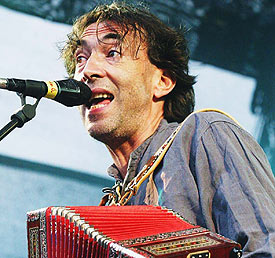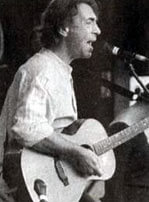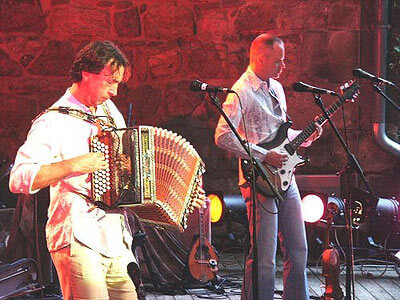GRENZENLOS TOUR 2002
Boundless-goosebumps-Goisern
Convincing, down-to-earth alpine rock with Latin elements
Percussionist Bernd Bechtloff subtly started the rhythm, guitarist Gerhard Überbacher softly plucked the theme, but only when a sweaty Hubert von Goisern breathed "Heast as net" into the microphone with his eyes closed, came the typical goosebumps effect which you cannot avoid with this piece. Even as the people talked about their impressions after the concert, it returned. And everyone was in agreement: it was good!
Hubert von Goisern presented his new programme Grenzenlos in March this year. That this happened in Egypt of all places was somewhat suspicious: Aha, something exotic again. Masses of curiosity, therefore around 1000 people rushed to the Haberkasten-Innenhof on Monday evening in order to hear what the all-round musician had to offer.
What they heard was a concert which was peppered with some familiar numbers from his Fön and Trad albums, but also many new things in a harmonious mix with Latin elements.
The sold-out concert began with a 45 minute delay due to technical problems, but Goisern compensated the waiting audience in remarkable ways. The Austrian artist spared no pains, during the almost three hour long performance, he lured the last reserves from his body. Undoubtedly one buys him: he lives his music and for his music.
And there is barely an instrument the all-rounder does not master. Begun bluesy with the accordion, he seizes the electric guitar in order to make a seamless transition to funk in the style of Lenny Kravitz, after that further calming down as celestial sounds are to be heard. Later he takes hold of the flugelhorn in order to venture a first journey into jazz, virtuoso his playing on the flute. Only he appears to understand the accordion and harmonica fit so aptly to Indian sounds. As if it had never been any other way.
But the Austrian is not just distinguished by his extensive mastery of many instruments. Nothing expresses his cosmopolitan stance more than his singing. Whether his own Salzburg Austrian slang or in deepest Swahili, embellished with yodels - the checkpoints between one language to another seem to be mobile. Boundless.
But what would Goisern be without his excellent combo? Of whom one is the Brazilian Antonio in the bass, who naturally stands on the stage in the appropriate World Cup football shirt. Pianist Burkhard Frauenlob, who opens up completely new worlds of sound with masterly Latin improvisations on the keys. Marlene Schuen may still be working on her dancing interludes, but there is no doubt about her talent on the violin and singing.
But above all, the attentiveness of the audience is directed towards Bernd Bechtloff, who on the percussion shows that you can also elicit a fascinating sound from a milk churn, and for almost three hours as a bundle of energy jumped about like Rumpelstiltskin. Goisern let African sounds from his album Gombe be heard with Akipenda. Traditional songs from his homeland rang out with Über d'Alma or with Katholisch.
He went on sentimentally in his encore with Wann i durchgeh durch's Tal with which he invited the crowd to sing along. And as he ended the concert with Heast as net, his fans applauded - almost endlessly.
Hubert von Goisern: Live in Mühldorf - 8th July 2002

Hubert von Goisern: Live in Mühldorf - 8th July 2002
Photo: © www.muehldorf.de
Hubert von Goisern: Live in Mühldorf - 8th July 2002
Photo: © www.muehldorf.de
Hubert von Goisern: Live in Mühldorf - 8th July 2002
Photo: © www.muehldorf.de
Hubert von Goisern: Live in Mühldorf - 8th July 2002
Photo: © www.muehldorf.de
Hubert von Goisern: Live in Mühldorf - 8th July 2002
Photo: © www.muehldorf.de
Hubert von Goisern: Live in Mühldorf - 8th July 2002
Photo: © www.muehldorf.deThe innermost part returned to the outside
 Can
one do a Hubert von Goisern justice from the view of the comparative
music critic? I think yes, because the perhaps most fundamental music
- and that is what directly appeals to the people - can always drop the
method of the music critic and must also allow it. One views the 20th
century objectively, even if one has spent the main part of one's life
in it, then during and after there were the late Romanticism evolutions
which took themselves seriously in order to peter out sometime. The late
Romanticism still had an enthusiastic to critically reflecting audience.
Can
one do a Hubert von Goisern justice from the view of the comparative
music critic? I think yes, because the perhaps most fundamental music
- and that is what directly appeals to the people - can always drop the
method of the music critic and must also allow it. One views the 20th
century objectively, even if one has spent the main part of one's life
in it, then during and after there were the late Romanticism evolutions
which took themselves seriously in order to peter out sometime. The late
Romanticism still had an enthusiastic to critically reflecting audience.
The other ways like twelve-tone, aleatoric and others, more and more only found the acceptance of experts. Somebody like Bernstein already spoke earlier of the error of having deserted the major/minor tonal paths and remained stubbornly on the familiar paths with his creation, but also not neglecting the edge. And the neo-romantic composing of the last two decades whatever the phenomenon of minimal music does not only lead back to expanded major/minor tonals, but also to a larger audience. The one musical direction which in the past century has never lost the good relationship with people, was jazz music. It continues what baroque, classical and romantic began. The great variety of jazz always renewed itself and found new ways. Rock and pop music in their whole range remain in the slipstream, partly with very fluid crossings. And whether a Hubert von Goisern is so far away from a Ludwig van Beethoven as a person as a musician, I venture to question. The form of their pieces is different. But both were searchers their whole lives and went and go self-confidently to stubbornly their very individual way. Again and again Goisern searches for new pollinations, partly through his very long journeys to Tibet and Egypt. Again and again he searches the proximity of the things foreign to him, in order to let one's own self developed in a new condition through the examination of these different things. It does what many artists and also many of us normal mortals do not do any more. Getting involved in the foreign and the different consciously and if it must be, without protection, in order to then recognise the new in oneself. Only whoever goes out into the world finds new aspects in one's own self. Hubert von Goisern is an eternal questioner and searcher and will always remain so. Whether he will also be subject to such radical artistic changes like a Beethoven, only time will tell.
Both, one was it, the other still is, are also uncompromising and passionate humanists deep in the hearts. A Beethoven seemed extremely nonconformist in his time. A Goisern also does not seem to be exactly easy-care. And both made/make music which directly appealed to their environment and also provoked and still does this. And both have thoroughly studied music, a Hubert von Goisern in Vienna for a while. And both carry the name of their origin with them. Goisern comes from Bad Goisern in the Salzkammergut. And Beethoven's forefathers, Dutch farmers, made it clear to this musical giant by name where his roots were: the composer of the Ninth and Missa solemnis was called, translated into German, nothing other than "Ludwig von den Rübenhöfen" (Ludwig from the turnip farm).
At the concert in the inner courtyard of the Herzogsschloss, Hubert von Goisern gathered his fans around him in the best weather. Some of them came, it was to be seen by the car number plates, from far away. In the area near the stage one listened more, in the hindmost part, the conversation outweighed the listening. Goisern has always lifted his origin from folk music to the essence of his music. His music is, even with serious and thoughtful lyrics, basically always positive. But after all, you can also have a positive attitude towards life somewhat more quietly.
Hubert von Goisern is as convincing as a person as a creative and musical artist. When he makes an appearance, he turns his innermost intense part outside. He lets us look into his heart. He is thoroughly honest in a time where it occurs now and then as if the honesty were something unnecessary and superfluous. Or world would be poorer without a radical forwards-striding Hubert von Goisern. And this question to his adoring public is allowed: does it not do us all good to experience someone like Hubert von Goisern now and again, someone who has translated for himself our dreams of a really independent individual way of life and who will also carry on doing this for our continual enrichment?
Hubert von Goisern: Live in Biel - 28th June 2002
The pulse of the black continent
Hubert von Goisern delights his fans at Heumarkt
 Alternative
programme at Heumarkt. After the classical highlight of the performance
of Guiseppe Verdi's most popular opera Nabucco on
Friday evening, Hubert von Goisern filled the "Neue Kulturforum" next
to the reclining figures until it was bursting at the seams.
Alternative
programme at Heumarkt. After the classical highlight of the performance
of Guiseppe Verdi's most popular opera Nabucco on
Friday evening, Hubert von Goisern filled the "Neue Kulturforum" next
to the reclining figures until it was bursting at the seams.
The popular Austrian has sharpened his senses on a "boundless" lengthy tour through Africa and Asia. Immediately the first sounds on the harmonica have a hint of the oriental, which does not stop the multi-instrumentalist asking his imaginary counterpart why he is so grumpy in broad dialect. Should one of the audience have come to the concert grumpy, this mood will have certainly vanished in the course of the two and a half hour concert. A grasp of the Goiserer's trademark, the accordion, is enough for this, a wave of enthusiasm surges over the audience. In the process, the 50 year old musician shows no symptoms of tired routine whatsoever, but in his authentic spontaneity has developed into a versatile world folk musician. He stands by his homeland, but at the same time you feel the pulse of the "black continent". The elements of foreign culture circles mix seamlessly with the alpine sounds, which stand inquisitively here and there like in a picture puzzle and then self-confidently again in the foreground. "Gemma nach Afrika" - but also come back again! This also shows itself linguistically - dialect in the lyrics takes turns here with English ("make changes piece by piece") and mad staccato's apparently senseless syllables. It is difficult to say what is invented language and what is African dialect.
Hubert von Goisern has developed himself again, but he does not deny his Alpinkatzen past because of that. In the meantime he processes elements of rock, pop, soul and jazz, sometimes hard at times atmospherically (the Italian violinist Marlene Schuen is brilliant!), but always with a musical sincerity which fills the whole place. The old walls of the venerable university which partly encloses the square also rake up rocky sound waves and then give them back to the enchanted audience.
The mild air of the evening and the warmth of the reflective farewell songs ("forced" with whistles and cat calls to three encores) go hand in hand with the listeners into the night. One could still hum along to the melody of Heast as nit, wia die Zeit vageht for hours.
Hubert von Goisern: Live in Würselen - 21st June 2002

The samba can also be excellently yodelled to
The musical rivers on which Hubert von Goisern paddles are fed by many streams. But right at the top at the source, which he makes clear again and again with all stylistic curiosity and great variety, the folk music of his alpine homeland bubbles, the country, Gstanzl, yodels, polkas stand which the thoroughbred musicians carries into a new time with deep respect and which he stands up for against every beer tent-blessed sell out. With his new band and an appropriate programme christened Grenzenlos the Austrian world traveller was now a guest at the Museumsinselfestival.
With the loud Alpinkatzen in leather knee breeches and the furiously yodelling Sabine Kapfinger, the alpine rocker with the Styrian accordion was a great success at the beginning of the 90s, but was so run down by the immense success of his contemporary jazzed up folk music that he threw in the towel eight years ago, disbanded the group and looked for peace and new inspiration in Tibet and Tanzania. He gave concerts in West Africa with his new band and shortly before was cheered at a joint appearance with Mohamed Mounir in Egypt.
The band, whom he now brought with him to Berlin, has little in common with the freaky liveliness of the Alpinkatzen. The music has opened in every direction and comes along with such professional precision that one almost misses the roughness, the uncouthness, the unpredictability a little. Hubert von Goisern has opened a global mainstream in which with all the enthusiasm of spirit something is lost. But perhaps it is simply because you cannot play with the usual loudness at the Museumsinsel due to the noise prevention conditions. The alpine world musician is at his best when he straps on his accordion, pulls the bellows as far as they will go and drags tradition into today.
The mountain pastures are yodelled over with holla-radi-edldi, with Gemma nach Afrika the whole place begins to bob up and down. He adds new lines to the song Iawaramoi, which arose in the face of the Bosnian war, about the conflict between the Palestinians and Israelis, with Katholisch it gets ribald, then poetic balladic sounds are played again.
With percussionist Bernd Bechtloff, keyboarder Burkhard Frauenlob, guitarist Gerhard Überbacher, drummer Bernhard Wimmer and violinist Marlene Schuen, Hubert von Goisern has an experience troupe of musicians behind him. And Antonio Porto, the Brazilian bass player, appeared in the football shirt of his national team in honour of the Cup Final.
The "Goiserer" does not talk much, and when he does, his southern state slang is not always easy to understand. It does not matter. Instead there are loads of traditional alpine melodies into which African township jive, Arabic tonality, black American funk, Caribbean reggae and Brazilian samba continually flow. The music really is without frontiers.
Madness and alpine sound blend
Hubert von Goisern at Schiffenberg
The really big caravans - one bus after the other - moved in the direction of Schiffenberg on Saturday evening, discharging thousands of people, predominantly between mid-20s and mid-40s, onto the Giessen Hausberg. They all want to experience him, the Austrian world musician with the little gestures and those - sometimes embellished with yodels - songs, which are not always likely hits and nevertheless are good for great and celestial atmospheric pictures. For two and a half hours Hubert von Goisern handed over his tonally phenomenal character show, the gifted recording talent with typical Austrian charm and the charisma of an introvert, whose aura stands for less extravagant stage poses, but undoubtedly brings extroverted sounds together with his band under the audience. His accompanying musicians, who incidentally understand their craft and seem to be on an emotional wavelength with the master are not the Original Alpinkatzen any more mind you (since 1994). The current band consists of Marlene Schuen (violin, vocals), Antonio Porto (electric bass, electric guitar), Gerhard Überbacher (electric guitar, mandolin), Bernhard Wimmer (drums), Bernd Bechtloff (percussion) and Burkhard Frauenlob (keyboards). Frontman von Goisern enlarges around his trademarks, the diatonic accordion, takes hold of the acoustic and electric guitars, occasionally also uses the piccolo and trumpet.
Now, what exactly are they playing? Ethno pop, rock, blues or what? All of that not exclusively but rather an alpine-tainted, but still homogenous sound-mixture, which almost drives so called music critics to desperation and which leaves the unknowing audience in a range of feelings, from awe and emotion to mawkishness. To be primarily experience-addicted is something that is said about the musician and from that his audience profits, - if also in a totally different way. So little by little namely quite a few journeyed pairs are reconciled in dancing ways - sometimes dreamily like young lovers. Orientated towards the usual dramaturgy of a large event, this memorable Schiffenberg evening turns out to be a more celestial stronghold the longer it lasts. Effectively staged with the darkness falling and in any case very flattering lighting enhancing the musicians, the title Akipenda finally reveals from where Goisern has looked for musical loans in recent years: Africa.
After April concerts and other experiences in Cape Verde, Burkina Faso and Senegal, the appearance for the current Grenzenlos 2002 tour began in May through the German-speaking countries. A kind kind of style cross section of Goisern's style of thinking. Boundlessly ambiguous, mercilessly rhythmic and frequently also sentimentally balladic. With the encores Spat and the earlier classic Heast as nit, von Goisern bids his fans a Schiffenberg farewell as if he could not be any more sensitive. Without a doubt man and women left the event moved. Rhythm and feeling: Hubert, please come again sometime!



